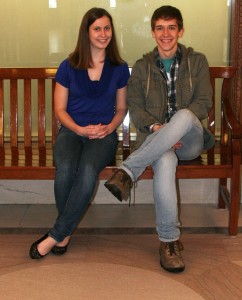
Senior Hannah Watkins, Take Five Scholar Nathaniel Lindsey (pictured above) and alumnus David Liebers ‘09 all received Fulbright grants. Courtesy of Drue Sokol.
Seismic technology that generates geothermal energy on a rift in Ethiopia. Proteins that trigger the release of a drug that forms the basis of groundbreaking new chemotherapy treatment. Marxist and fascist political arrangements in the early 20th Century that influenced evolutionary biologists.
No, these are not suggestions for a long overdue research paper, but rather they are obscure research topics that turned into prestigious U.K. Fulbright fellowships last week for two UR undergrads and one alumnus after hours of grueling applications, proposals, interviews and internships.
The U.K. is widely regarded as the most competitive country for Fulbright grants. Of the 700 applications for 35 highly contested spots, UR produced three recipients for the first time in its history. Take Five Scholar Nathaniel Lindsey will pursue geothermal energy at Edinburgh University, senior Hannah Watkins will study new chemotherapy drugs at the Imperial College of London and alumnus David Liebers, ’09, will investigate the relationship of evolutionary biology and political thought at the University of Leeds’ Center for History and Philosophy of Science.
The arduous process of applying for a Fulbright grant typically takes a full year and requires not only extensive research and a high GPA, but also strong interpersonal skills, faculty connections, impeccable writing abilities and, above all, a detailed proposal for independent study that is “ideal but still feasible” — or uniquely stellar, yet adaptable and realistic.
“The onus is really on the student, unlike in undergraduate study abroad programs,” Belinda Redden, Director of Fellowships at UR (who also assists in various parts of the selection process), said. “Students have to determine what institution and what researcher they can work with abroad, then craft a project that will be mutually interesting, while specifying how they will serve as an exemplary ambassador for the U.S. and how the project will contribute to their future plans.”
Fulbright awards, which are granted for teaching English or for research, and which provide complete funding for recipients while abroad, are offered in 104 countries and are designed to foster global citizenship by mandating return to the home country after one year in order for the recipient to disseminate cultural knowledge.
Watkins, a biomedical engineering major and music minor, discovered her foreign contact, a bioengineering and nanotechnology expert, after doing research on drug delivery in Biomedical Engineering Professor Danielle Benoit’s lab. She will conduct her own unique research in a chemotherapy research lab in the U.K.
“It’s a different system and a different approach, but we’re still trying to solve the same problem,” she said, adding that although the process of applying was “daunting,” it was also a learning experience and would have been extremely valuable whether or not she had won. “It gives you a lot more confidence in your abilities and made applying for grad school a lot easier.”
Lindsey, who graduated from UR with a self-designed degree in alternative energy and sustainable engineering with minors in Optics and environmental geology, is pursuing his fifth year in English literature. He became interested in geothermal energy after an internship with the Department of Energy at the Lawrence Berkeley National Lab in California.
After connecting with Professor Cynthia Ebinger of UR’s Environmental Science Department, Lindsey learned of the teacher’s involvement with the Afar-Consortium — a group studying the tectonics of an area in Ethiopia where the faults of the earth are drifting apart in a way that suggests the future emergence of an ocean. With his background in sustainable energy, however, Lindsey hopes to move beyond the group’s study of tectonics to study magma-dynamics and investigate of the potential for sustainable geothermal energy in the area.
“I already understand the seismic aspect, so it’s my hope that I can go to the U.K. and learn magneto-telluric (MT) techniques, which is a niche in geophysics and only studied in a few places in the world,” Lindsey explained. “I’m hopeful that I will be able to combine these two data sets in order to really understand what is going on at sub-surface levels.”
He anticipates earning a master’s degree through research in his year abroad, after which he plans to return to the U.S. and follow through with the ambassadorial pledge of the Fulbright by using his unique knowledge of MT techniques in U.S. geothermal labs, a growing field.
In a more humanities-oriented Fulbright proposal, alumnus David Liebers ‘09, a history and evolutionary biology double major currently interning at the Freedom and Democracy Foundation in Warsaw, Poland, hopes to “study some history, some philosophy and some enjoyment of another year abroad,” he said. Liebers also became the first UR student to receive the prestigious Gates Cambridge Scholarship and has yet to decide which fellowship to accept.
“I’m interested in the legal, moral, ethical and medical consequences of advances in human genetics,” Liebers said. “The focus of my study will be on the historical connections between evolutionary science and politics — to put the current debate about bioethics and genetics in some kind of context.”
After obtaining a master’s degree from the University of Leeds in the U.K., Lindsey hopes to attend law school and become a legal academic working on issues pertaining to science and law.
Of the 23 candidates endorsed by UR this year, eight other students have been named finalists and await the determination of their grant.
Buletti is a member of
the class of 2013.



